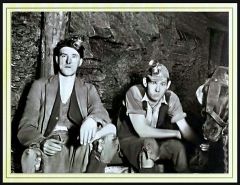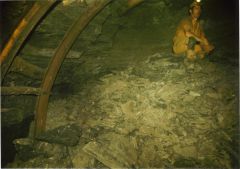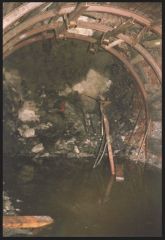Contributor Leaderboard
Popular Content
Showing content with the highest reputation on 26/05/20 in all areas
-
Tuesday - 26/05/2020 How does a penguin build its house? Igloos it together. Did you hear about the guy who invented the knock-knock joke? He won the 'no-bell' prize. I ordered a chicken and an egg online. I’ll let you know. I'm reading a book about anti-gravity. It's impossible to put down!2 points
-
Bringing us up to the present day ... The Anglo-Saxon word halig, meaning “of good augury” (a good sign/omen) or “inviolate” (free or safe from injury or bad health), was already in use in Old English and there is good evidence to support a theory that it adopted some religious significance during the Middle English period (1100-1450). We find this evidence very near to home – in Durham. William M Aird in his work, St Cuthbert and the Normans: The Church of Durham, 1071-1153 (1998), tells us of Cuthbert’s importance in defining the identity of those who lived in the “Liberty of Durham”, an area of private jurisdiction not directly administered by the king but by someone who enjoyed the same, or similar, rights – in this case the Bishop of Durham. Cuthbert, Aird says, became an important symbol of the autonomy of the area and because of this the people living there became known as the “Haliwerfolc”. Knowing what we know so far, it’s not too difficult to break that word down into its component parts: haliw-er-folc. Haliw is the OE word halig, the letter ‘g’ having been replaced by ‘w’ in an attempt to reproduce the ‘hockle’ sound which I discussed earlier. Er is a Middle English genitive implying a connection to (rather than ownership of) a thing or person and no prizes for guessing that folc means folk. From this we can see that at the beginning of the Middle English period the word halig has acquired a definite religious significance. There are some who believe there is a relationship between ‘whole’ and ‘holy’ and that the religious sense of holy may have developed from keeping believers spiritually whole. https://www.google.com/search?q=holy+etymology&rlz=1C1GGGE_svSE562SE627&oq=holy&aqs=chrome.1.69i57j35i39l2j0j46j0l2j46.8504j0j15&sourceid=chrome&ie=UTF-8 A quick peruse of the Oxford Concise Dictionary of English Etymology confirms that the roots of whole and holy are in fact the same – hal. In retrospect, “whole” and “free from injury” do have a lot in common. Barber, The English Language, a Historical Introduction (1997), notes that already at the beginning of the period, 1100 AD, a few other Anglo-Saxon words were being used in relation to Christianity, among them: eastre (Easter), derived by Bede from the name of a goddess whose feast was celebrated at the vernal equinox and hel (Hell), then meaning to cover or conceal. However, halig despite its transferred meaning is still being pronounced with the long vowel sound ‘a’, as in Harley (without the ‘r’). This pronunciation appears to have changed early in the Middle English period in a series of vowel changes which included the previously mentioned munt to mount when some short vowel sounds were lengthened. Several scholars have described these changes, and among them is the transition of the Old English long vowel sound ‘a’, as in Harley, to a different vowel sounding like ‘aw’. Scholars usually compare it to the vowel sound in law but, having heard this sound during my studies, I prefer to liken it to the same vowel sound ‘aw’ in bought but with a heavy leaning towards the Geordie pronunciation of boat. This new sound was represented in spelling by the letter ‘o’ so that halig/haliw became holig and, like Hollen, it eventually lost its last consonant. These changes, I might add, only occurred in the north of England and the reason why is as yet unexplained. My own personal theory is related to influence from the Viking invasions. Southern England continued to use ‘a’ both in speech and writing and later, towards the end of the Middle English period, we find the first recorded evidence of holy in its present form, translated from the ecclesiastical Latin, sanctus spiritus meaning Holy Ghost in the Wycliffe Bible of 1382. A further change to some long vowel sounds occurred in the following period of Early Modern English (1450-1700) – but this time only in the south, more particularly in the London area. In a process which lasted at least two hundred years, and probably the biggest ever change in the pronunciation of English, The Great Vowel Shift, as it’s come to be known, changed the pronunciation of a special group of vowel sounds – those long vowel sounds which are formed at the back of the mouth, like the ‘a’ in halig. The result was vowel sounds which were formed at the front of the mouth, like the ‘o’ in holy which halig became. This was not, however, the same ‘o’ sound being used in the north. This was the result of a completely different process. The southern ‘o’ sound was the sound we now hear in what we call the Queen’s English, or ‘posh’ English as some call it, when the word ‘boat’ is said. So, for many years we had two different pronunciations of the word holy- one sounded like Queen Elizabeth II, the other like @High Pit Wilma. It’s not really known why this major change occurred. Several theories have been put forward. The redistribution of people due to the Black Plague causing changes in the vernacular of London is one such theory, while the hoi polloi’s struggle with pronunciation of the influx of French loanwords is another. A third is a wave of nationalism which swept over England when French rule finally ceased in the fifteenth century. No one really knows. What we do know is that it added to the confusion and irregularity of English spelling in a very big way causing pronunciation and spelling to diverge even further. Many other languages have undergone a similar ‘shift’: German, Spanish, Latin and French for example, but their nations have, through spelling reforms etc. tried to bring the written language nearer the spoken. In England, there is, traditionally, no regulating body for this sort of thing so the idiosyncrasies, irregularities and difficulties of English spelling remain. Thank heavens for that, I say! Without them we would not be able to see and feel the wings of history in our language. Even though the language is constantly changing, no major changes have occurred since The Great Vowel Shift and for this reason I don’t intend to research our words, Holly, holy and mount, any further. They have, to a great extent, arrived at their modern day form and pronunciation by the end of the Early Modern English period in 1700 AD but, it was some years later that the southern variant of pronunciation became the Standard English pronunciation. This is hardly surprising as the seat of power was London. London had always been part of the dominating dialect area: first on the southern border of Mercia, then included in the East Midland dialect area which was later accepted as the standard variant of English much thanks Caxton’s printing press. There’s a saying in linguistic circles that the difference between a dialect and a language is that a language has an army and a fleet of ships. It’s true! All over the world standard languages have arisen from the adoption of the dialect spoken in the areas of power, administration and finance – the capital cities. Time to move on to Bedlington now and a question: Does anybody know of any map of Bedlington before 1806? If you do I’d love to hear about it. To be continued ….2 points
-
Oddly enough, most of that was done in the garden! surrounded by nature The only real indoor work was in the library, which I did before the corona restrictions, and some bedtime reading. The isolation gave me the time to sort out my notes and write it up. Fortunately, apart from two snow days mid May we've had great weather - and still have! As for giving the brain a rest: Brains 'of a certain age' should not be put out to pasture. They should be exercised regularly, fed continuously with new things to do and 'rest' only while sleeping.1 point
-
And I hope you are now going out into the garden and allowing nature to relax your thoughts and give that brain a rest 🌼🦋🍹1 point
-
1 point

.thumb.jpg.7493ddab4a696108cf2b849323d3c155.jpg)




















